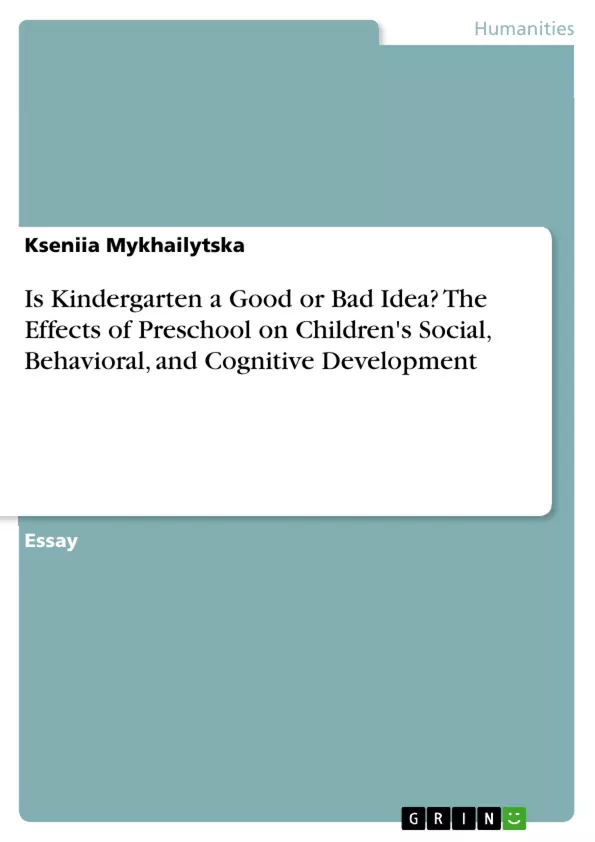This paper examines the effects of preschool on the development of children's learning skills, moral behavior, and social competence. It is based on the research on the impact of care centers on kids.
The articles considered in the paper analyze three aspects of preschool education: behavioral, social, and cognitive. Although the articles present different perspectives on the issue, the results of the studies may be attributed to the position either for or against children's attending kindergarten.
As preschool is found to have possible positive influence in only one scale out of three, its impact on children is considered mostly negative. The conclusion can be drawn that attending kindergarten is not an indispensable condition of kids' development. The suggestion is made that preschool system requires innovative highly qualified and affordable programs that would use an individual approach to children. An alternative solution implies sending children to kindergarten for no longer than three hours a day followed by enhanced parents' care.
Inhaltsverzeichnis (Table of Contents)
- Kindergarten - Good or Bad Idea?
- The Effects of Preschool on Children's Social, Behavioral, and Cognitive Development
- Reasons for Sending Children to Kindergarten
- The Negative Influence of Preschool on Children's Behavior
- The Positive Perspective on Kindergarten
- The Impact of Kindergarten on Children's Communication Skills
- The Importance of Social-Emotional Functioning
- The Influence of Preschool on Children's Cognitive Development
Zielsetzung und Themenschwerpunkte (Objectives and Key Themes)
This paper explores the multifaceted effects of preschool on children's social, behavioral, and cognitive development. It examines the impact of kindergarten on children's learning skills, moral behavior, and social competence, analyzing various research perspectives.
- The impact of preschool on children's behavior.
- The influence of kindergarten on children's communication skills.
- The role of preschool in fostering children's cognitive development.
- The importance of social-emotional functioning in early childhood.
- The pros and cons of attending kindergarten.
Zusammenfassung der Kapitel (Chapter Summaries)
- Kindergarten - Good or Bad Idea?: This chapter introduces the debate surrounding the benefits and drawbacks of attending kindergarten, highlighting the diverse perspectives of parents and experts.
- The Effects of Preschool on Children's Social, Behavioral, and Cognitive Development: This chapter delves into the research on the impact of preschool on children's development, examining the key areas of behavior, communication, and cognitive skills.
- Reasons for Sending Children to Kindergarten: This chapter explores the historical and contemporary motivations behind parents' decisions to enroll their children in kindergarten, contrasting the needs of working parents in the 19th century with the modern expectations of educational and social development.
- The Negative Influence of Preschool on Children's Behavior: This chapter focuses on the research findings that suggest a potential negative impact of preschool on children's behavior, highlighting the increased stress levels and behavioral problems observed in some children attending kindergarten.
- The Positive Perspective on Kindergarten: This chapter presents an alternative perspective, emphasizing the benefits of kindergarten in providing structure, socialization, and professional care for children. It acknowledges the importance of timely lunches and health checks, as well as the potential for developing social competence.
- The Impact of Kindergarten on Children's Communication Skills: This chapter examines the research on the effects of preschool on children's communication skills, exploring the potential drawbacks of peer grouping and the importance of diverse social environments.
- The Importance of Social-Emotional Functioning: This chapter highlights the significance of assessing children's social-emotional functioning at preschool, emphasizing the need for early intervention to address potential challenges.
- The Influence of Preschool on Children's Cognitive Development: This chapter explores the impact of preschool on children's cognitive development, examining the potential for cognitive gains and the importance of individualized learning approaches.
Schlüsselwörter (Keywords)
This paper focuses on the critical topics of kindergarten, behavioral problems, cognitive development, and social competence in early childhood. It examines the effects of preschool on children's learning skills, moral behavior, and social skills, exploring the various research perspectives and potential consequences of attending kindergarten. The paper emphasizes the need for individualized approaches to preschool education and explores alternative solutions to address the potential drawbacks of traditional kindergarten programs.
Frequently Asked Questions
What aspects of preschool education does this paper analyze?
The paper examines three main aspects of preschool education: behavioral, social, and cognitive development in children.
Does the research conclude that kindergarten is mostly positive or negative?
The paper finds potential positive influence in only one out of three scales, leading to the conclusion that the overall impact is considered mostly negative and not indispensable for development.
What are the potential negative effects of preschool on children's behavior?
Some studies suggest increased stress levels and behavioral problems in children attending kindergarten, as well as potential issues with peer grouping and communication.
What were the original reasons for sending children to kindergarten?
Historically, in the 19th century, it was a necessity for working parents. Modern reasons include the expectation of educational structure, socialization, and professional care.
What alternative solutions are suggested in the paper?
The paper suggests innovative, affordable programs with an individual approach, or limiting kindergarten to no more than three hours a day followed by enhanced parental care.
How does preschool affect children's cognitive development?
While there is potential for cognitive gains, the paper emphasizes that these require individualized learning approaches rather than traditional peer-grouped settings.
- Citation du texte
- Kseniia Mykhailytska (Auteur), 2016, Is Kindergarten a Good or Bad Idea? The Effects of Preschool on Children's Social, Behavioral, and Cognitive Development, Munich, GRIN Verlag, https://www.grin.com/document/322993



